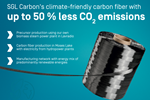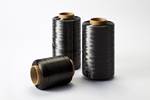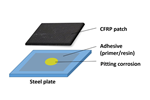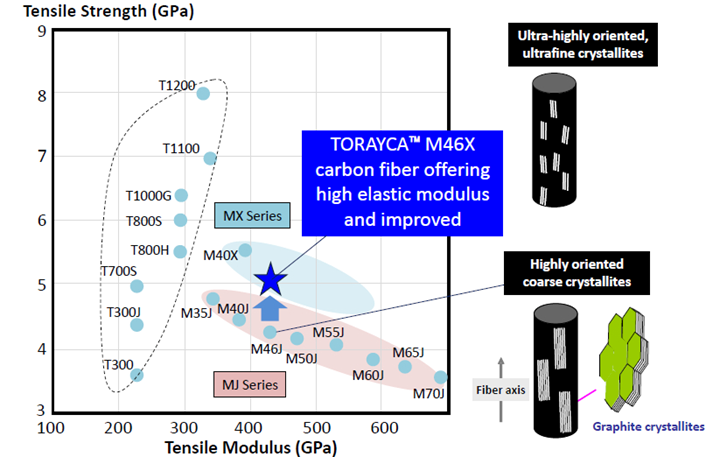Torayca M46X carbon fiber achieves high tensile modulus with 20% strength increase
Maintaining high strength and tensile modulus exceeding 350 GPa has been achieved using Toray’s nano-level structural control technology.
Toray Industries Inc. (Tokyo, Japan) has developed Torayca M46X carbon fiber, a material offering that is reported to be around 20% stronger than others in the Torayca MX series while maintaining a high tensile modulus. Using Torayca M46X reduces the weight of carbon fiber-reinforced polymers (CFRP), reducing their environmental impact.
Typically, there is a trade-off between carbon fiber’s tensile modulus and strength; boosting strength while maintaining a tensile modulus exceeding 350 GPa presents technological challenges. However, Toray says, the sporting and leisure goods markets demands both qualities to maintain performance while using less carbon fiber to reduce the weight of molded parts.
Toray developed Torayca M46X by pushing the structural control technology envelope. Nano-level control of the graphite crystalline structure inside fibers has resulted in an ultrafine, ultrahigh orientation, producing carbon fiber that is more than 20% stronger than conventional materials while maintaining its tensile modulus.
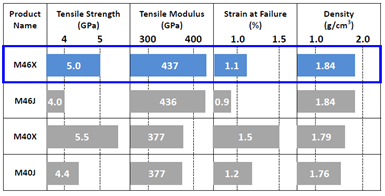
The company will also deploy Torayca M46X prepreg, which uses a Nanoalloy resin matrix, a proprietary microstructure control technology. The new product will significantly enhance compressive strength to boost stiffness while retaining strength, reducing the weight of finished products and broadening design flexibility, according to Toray.
Developing high-performance carbon fibers with a high tensile modulus exceeding 350 GPa began with Torayca M40 with graphitized yarn. The Torayca MX series, specifically, was created by applying technologies to control graphite crystalline structures and orientations inside fibers. The first offering in this series was the Torayca M40X, launched in 2018, which has since earned a solid reputation as a high-performance carbon fiber and prepreg.
Related Content
-
TU Munich develops cuboidal conformable tanks using carbon fiber composites for increased hydrogen storage
Flat tank enabling standard platform for BEV and FCEV uses thermoplastic and thermoset composites, overwrapped skeleton design in pursuit of 25% more H2 storage.
-
3D-printed CFRP tools for serial production of composite landing flaps
GKN Aerospace Munich and CEAD develop printed tooling with short and continuous fiber that reduces cost and increases sustainability for composites production.
-
Plant tour: Teijin Carbon America Inc., Greenwood, S.C., U.S.
In 2018, Teijin broke ground on a facility that is reportedly the largest capacity carbon fiber line currently in existence. The line has been fully functional for nearly two years and has plenty of room for expansion.


